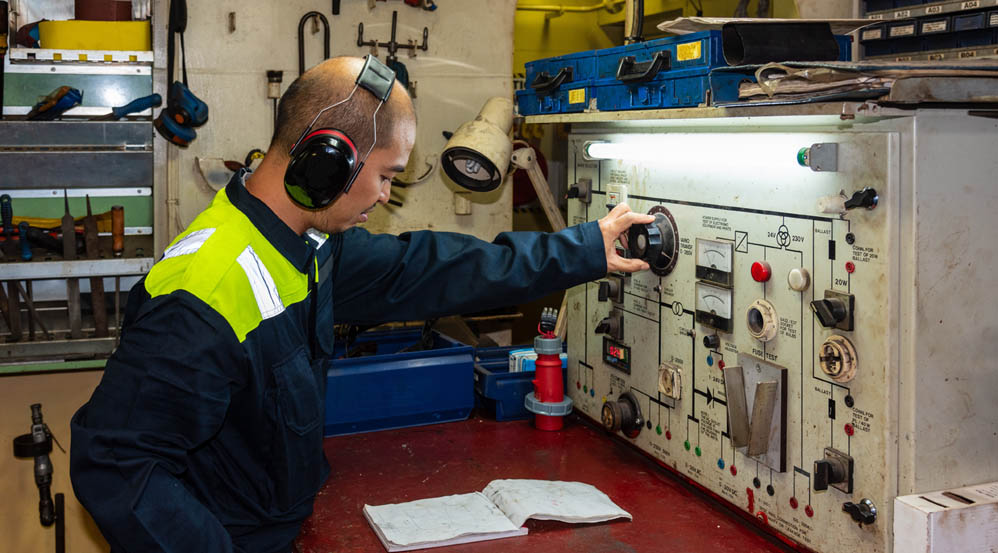- October 21, 2024
- Boat Maintenance
- Maintaining Electrical Components of a Ship: A Comprehensive Guide
The electrical systems on a ship are crucial for its operation, safety, and comfort. From navigation and communication equipment to lighting and propulsion systems, maintaining these components is essential for ensuring a vessel operates efficiently and reliably. In this blog, we’ll explore the best practices for maintaining the electrical components of a ship, highlighting key areas to focus on and providing tips for effective upkeep.

Understanding the Electrical System
Before diving into maintenance, it’s important to understand the ship’s electrical system. A typical marine electrical system consists of:
- Power Generation: Typically from diesel generators, which provide electricity for all onboard systems.
- Distribution: This includes switchboards, circuit breakers, and bus bars that distribute power to various systems.
- Load Management: Systems that ensure that electrical loads are balanced and properly managed.
- Control Systems: Equipment used for monitoring and controlling various electrical functions.
Key Areas for Electrical Maintenance
Routine Inspections
Regular inspections are critical for identifying potential issues before they escalate. During inspections, focus on:
- Wiring and Connectors: Check for signs of wear, corrosion, or fraying. Ensure all connections are secure and free from moisture.
- Circuit Breakers and Fuses: Test functionality and check for overheating or tripping issues. Replace any faulty components immediately.
- Grounding Systems: Ensure grounding connections are secure and corrosion-free, as proper grounding is essential for safety.
Cleaning and Corrosion Prevention
Marine environments can be harsh, leading to corrosion and dirt accumulation on electrical components. Regular cleaning helps maintain performance and longevity:
- Cleaning Procedures: Use appropriate cleaning agents to remove dirt and salt deposits. Be cautious with sensitive components; always follow manufacturer guidelines.
- Corrosion Inhibitors: Apply corrosion inhibitors to connectors and terminals to prevent oxidation. Consider using marine-grade electrical grease for added protection.
Battery Maintenance
Batteries are vital for starting engines and providing backup power. Proper maintenance ensures reliability:
- Regular Testing: Check battery voltage and specific gravity (if applicable) to ensure optimal performance. Replace batteries that show signs of weakness.
- Clean Terminals: Keep battery terminals clean and free from corrosion. Tighten connections and apply protective grease.
Testing Electrical Systems
Conduct regular tests to ensure that all systems are functioning correctly:
- Load Testing: Assess the performance of generators and distribution panels under load to verify they can handle operational demands.
- Voltage and Current Checks: Use multimeters to measure voltage and current at various points in the system, ensuring they are within recommended ranges.
Documentation and Record-Keeping
Maintaining detailed records of inspections, repairs, and replacements is essential for effective management:
- Maintenance Logs: Keep logs of all maintenance activities, including dates, issues found, and corrective actions taken.
- Manufacturer Manuals: Store manuals for all electrical components for reference during troubleshooting or repairs.
Training and Awareness
Proper training for crew members on the electrical systems can prevent issues and enhance safety:
- Safety Protocols: Ensure crew members understand electrical safety protocols, including lockout/tagout procedures.
- Hands-On Training: Provide training on basic troubleshooting and maintenance tasks, empowering crew to address minor issues before they escalate.
Conclusion
Maintaining the electrical components of a ship is vital for ensuring operational efficiency, safety, and comfort onboard. By focusing on routine inspections, cleaning, battery maintenance, system testing, documentation, and crew training, ship operators can significantly enhance the reliability of their electrical systems. In a world where technology plays an increasingly crucial role in maritime operations, prioritizing electrical maintenance is essential for a smooth sailing experience. Whether you’re a seasoned mariner or new to the field, understanding and implementing these maintenance practices will contribute to the longevity and reliability of your vessel’s electrical systems.
